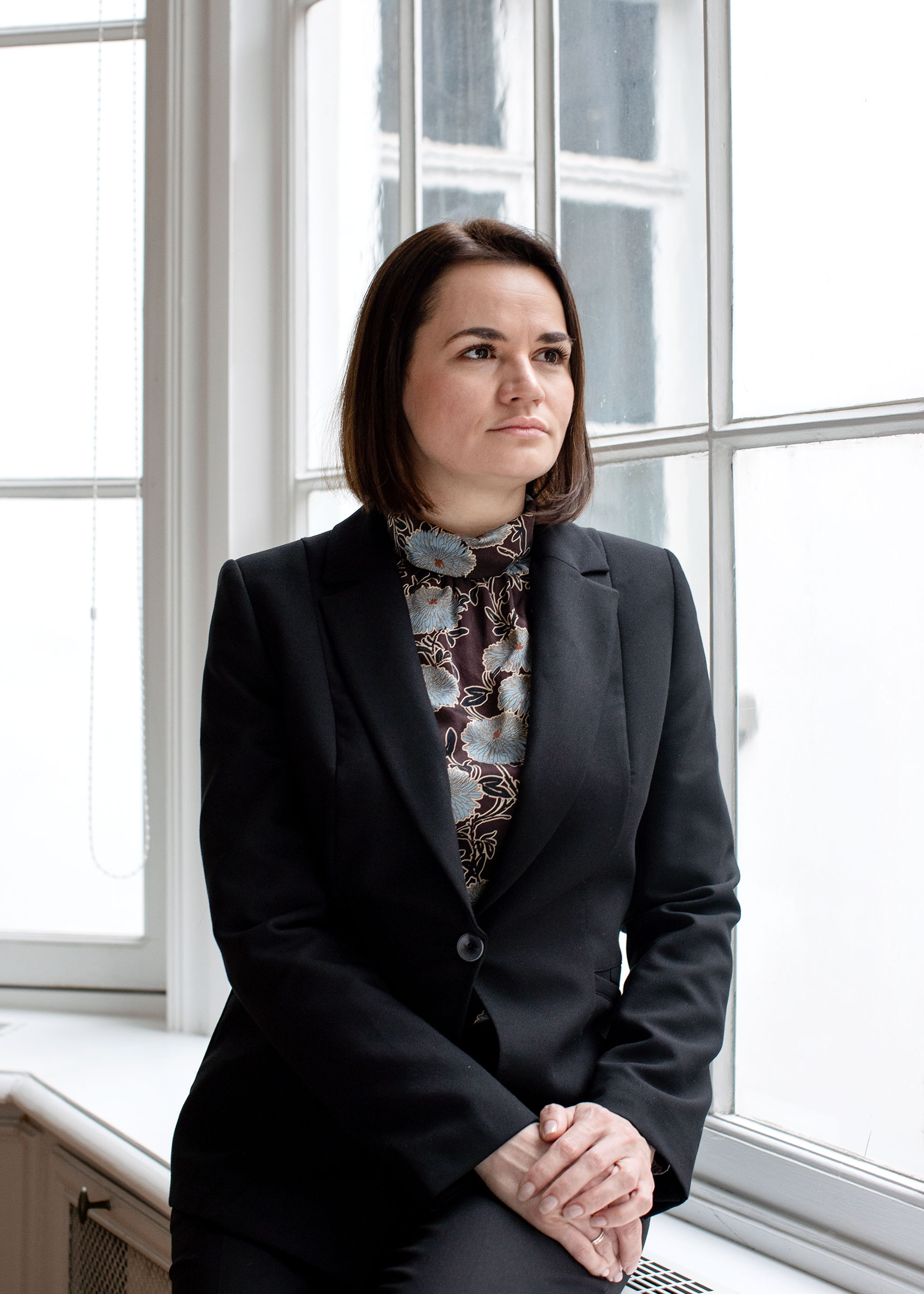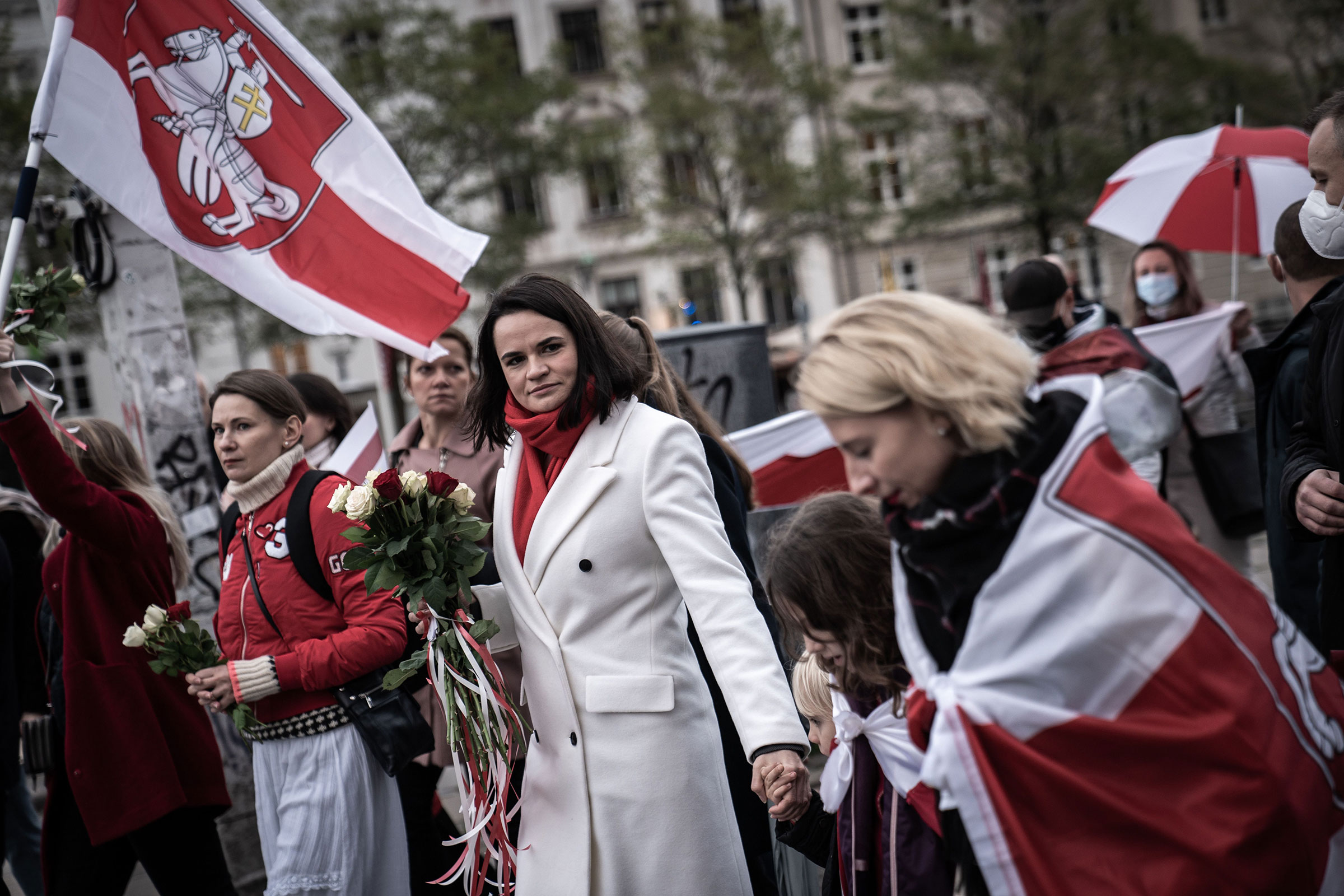
On a hot summer day last August, Svetlana Tikhanovskaya was pacing up and down her empty apartment in Minsk, the capital of Belarus in Central Europe, her life—and her country—in turmoil. With her husband in jail, she had sent her two small children out of the country, to safety, and she now faced a stark choice, bluntly handed to her by the nation’s hard-line security forces: flee into exile herself, or face arrest. “I had a couple of hours, but I could not pack anything, because I was so overstressed,” she recalls. “It was a shock. I was not prepared for this.”
Indeed, it is hard to imagine how Tikhanovskaya could have prepared for the jolting transformation of her life. Within the space of a few months, she emerged from obscurity to become the leader of Belarus’ biggest revolt in decades, determined to bring down President Alexander Lukashenko, who has ruled the former Soviet republic with an iron hand for more than 26 years as what many call Europe’s last dictator—thanks largely to the backing of Russian President Vladimir Putin.
Until last year, Tikhanovskaya, now 38, was a full-time mother, planning to pick up her earlier career as an English teacher. Then last May, the government arrested her husband, Sergei Tikhanovsky, thwarting his run for President in August elections, in opposition to Lukashenko.
With no political experience, Tikhanovskaya jumped in to replace Sergei as a candidate, campaigning alongside the wife of another jailed activist and the female campaign manager of a third. In Lukashenko’s mind, the three women—who were barely adults when Lukashenko came to power in 1994—barely seemed like a threat. But Tikhanovskaya, a soft-spoken neophyte appointed as leader by the group, exhorted the crowds to oust Belarus’ strongman in the August vote. Her presence was electrifying. Thousands of women thronged to hear her, clutching flowers and draped in the opposition colors of red and white.
When Lukashenko declared he had won—claiming more than 80% of votes—people poured into the streets in outraged fury. Tikhanovskaya had reason to believe her own vote was around 75%. The estimate was based partly on voters who photographed and uploaded their ballots to a platform built by activists, in anticipation of election fraud.
Lukashenko responded by dispatching heavily armed security forces who beat protesters with truncheons and rifle butts, and hauled them into miserable, jam-packed prisons. Amid the upheaval in August, Tikhanovskaya slipped across the border into Lithuania, where she now lives in exile with her children, ages 10 and 5, plotting the downfall of her nemesis, Lukashenko. She spoke to TIME in December, during a visit to Brussels.
Lukashenko has likened his beleaguered presidency to the last days of the Soviet Union before its collapse in 1991. His foes are tools of foreign governments, plotting a “blitzkrieg coup,” he told his supporters on Feb. 11: “We must endure no matter the cost.” The cost has been severe. Outraged by Lukashenko’s actions, the European Union is preparing its fourth round of economic sanctions against his officials. More than six months of protests have left Belarus’ economy on its knees, and even a $1.5 billion bailout from Russian President Vladimir Putin last September has not succeeded in stabilizing the country.

On Monday, Lukashenko met Putin again in Sochi, Russia, to ask him for another $3 billion, according to Russia’s Kommersant newspaper—a loan that could open the way for Putin to have a far greater hold over Belarus. Opposition leaders predict that could further ignite protests, as people see their country increasingly in the pocket of Russia—perhaps one reason Lukashenko has denied asking Putin for financial help. “People don’t want to give up independence to save Lukashenko’s ass,” says Franak Viacorka, a Belarusian journalist and adviser to Tikhanovskaya. Yet the country’s ruler now badly needs Putin’s help. “Lukashenko is cornered,” he says. “He doesn’t have a choice.”
Protests have simmered down in recent months, but activists say they plan to return with full force in the spring, despite the mass arrests. Tikhanovskaya estimates about 33,000 people have been detained since August, in a country of just 9.5 million. More than 900 face criminal charges, some of which carry 15-year prison sentences, according to Viacorka. “People are being tortured, in violence and chaos,” Tikhanovskaya says. “It is so scary, you cannot even imagine.”
At the risk of arrest, demonstrators send photos and videos of beatings, and details about where to demonstrate, to Nexta, a channel set up on the encrypted platform Telegram. “It is very dangerous for them to send this information,” says Stsiapan Putsila, 22, Nexta’s founder, who is based in Warsaw. “But their will to share the information is more significant.”
Tikhanovskaya says the past months have left her feeling drained, as she attempts to piece together, among the dozens of activists who have fled Belarus in recent months, a political force capable of collapsing a decades-old government. Called the Coordination Council, it now acts as a kind of government in waiting, with Tikhanovskaya as its leader. “We have been sleeping for 26 years,” she says. “We thought after every election, there would be a rise of people, but it was brutally cracked down on.” This time, however, she sees a profound shift. “People have started to feel that we are a nation,” she says. “They started to feel proud of this fact.”
Yet the task of knitting together a political opposition from outside the country is daunting. Sighing deeply, she says, “I feel so emotionally exhausted.”
Months on, she is still anguished by the choice she made that August day, as she paced her empty apartment in Minsk. She says she has been unable to quell the thought that security police might have tricked her into believing she was about to be jailed, simply in order to force her into exile. “Sometimes I doubt I made the correct decision,” she says.
If the Belarus leader believed banishing Tikhanovskaya would end her threat to his rule, he was wrong. From her headquarters in Vilnius, Tikhanovskaya and other activists have spent months plotting how to force Lukashenko out of power, and to seek help from Western officials. After finding her voice as a candidate in her home country, Tikhanovskaya says she has had to learn from scratch, on the fly, how to become a politician capable of negotiating with international leaders from exile. “It is so difficult to understand and realize that on your decisions, so much depends,” she says.
One key strategy, forged in regular talks with U.S. and E.U. officials, is to push for far tougher economic sanctions on Lukashenko and his government than those the bloc has so far approved. A separate effort is under way in Washington. After Tikhanovskaya consulted with U.S. State Department officials, Congress passed sweeping legislation in late November, saying that it would not recognize Lukashenko’s government, and backing Tikhanovskaya instead. U.S. Treasury officials say they intend listing the global assets of Lukashenko and his aides—a possible prelude to sanctions.
Forcing out Lukashenko will take even tougher action, however, given Putin’s billions in aid. Some hope that as Lukashenko becomes increasingly hated at home, Putin might pull back. “Lukashenko is totally dependent on Putin’s support, but how long Putin will stay with that support, nobody knows,” says Andrius Kubilius, a former Prime Minister of Lithuania, who heads a group of E.U. lawmakers supporting Tikhanovskaya. “When Putin stands beside Lukashenko, his popularity at home goes down.”
Lukashenko is already isolated. Since pushing Tikhanovskaya abroad, the embattled President has largely holed up in his capital trying to stamp out the protests. All the while, Tikhanovskaya has zipped across Europe, meeting German Chancellor Angela Merkel, French President Emmanuel Macron and other leaders. In Brussels in December, she and other Belarus activists were feted in the European Parliament, where they were awarded the E.U.’s human-rights honor, the Sakharov Prize. Standing at the podium in the vast Parliament chamber, Tikhanovskaya told lawmakers that a “wall of fear held us back for almost three decades.” That wall has now disappeared, she told them. “Everything has changed. We are bound to win.”
Her words brought loud applause from the E.U. politicians. “She is like Lech Walesa,” says Robert Biedron, a Polish member of the European Parliament, referring to the former Polish President, who led the country’s anti-communist revolution in 1989 and won the Nobel Peace Prize. “I know the role Walesa played for Polish society,” Biedron says. “And Svetlana is playing that same role in Belarus.”
And yet, despite her fast rise as a leader, Tikhanovskaya says she does not envision herself as the next Belarus President. She is painfully aware that her husband—the original presidential rival to Lukashenko—sits in a solitary cell in a Belarus jail, while she commands the attention of world leaders.
Tikhanovskaya says she is focused on ousting Lukashenko. Decisions about her own political future, she says, will come later. Should Lukashenko face trial? That question has two answers, she says. “As a person I cannot forgive his crimes,” she says. “But for the future of Belarus, he can leave for Russia, or wherever, or stay in his house.” Tikhanovskaya knows that decision would likely face strong criticism back home, after months of protests. “But if you have to think globally, sometimes you have to take such decisions,” she says, already sounding—after half a year in politics—like a seasoned leader.
More Must-Reads from TIME
- Donald Trump Is TIME's 2024 Person of the Year
- TIME’s Top 10 Photos of 2024
- Why Gen Z Is Drinking Less
- The Best Movies About Cooking
- Why Is Anxiety Worse at Night?
- A Head-to-Toe Guide to Treating Dry Skin
- Why Street Cats Are Taking Over Urban Neighborhoods
- Column: Jimmy Carter’s Global Legacy Was Moral Clarity
Contact us at letters@time.com